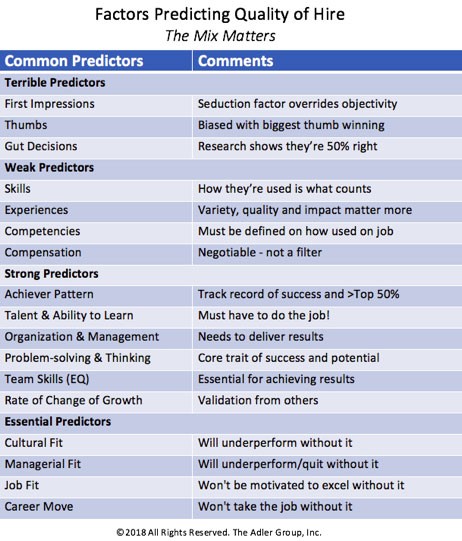The "No Salary History" Law Won't Make Recruiting Better—Getting Rid of Box-Checking Will
While some people are concerned about how the “No Salary History” law will affect hiring, the truth is that asking or not asking about salary really shouldn’t make a difference. It’s not going to make or break your recruiting process. In my opinion, there should be a law preventing companies from box-checking skills, experience, academics and salary history, too.
The reason: Asking these questions prevents companies from hiring diverse talent, top tier talent, highly motivated people and high potential people. None of these “must-have” factors matter. What matters is if the person is competent and motivated to do the work required and, if so, will do it for the salary being offered.
As a general recruiting rule, it’s always better to discover if the person is competent and motivated before discussing salary. This way you find out how talented the person is and if the open job matches before discussing his/her compensation needs. If the compensation doesn’t match but the person is talented, you’ll find another job for the person. Since you’ve done some relationship building with the person, you’ll also be able to connect on LinkedIn and proactively ask for referrals.
From a negotiating standpoint, if the job represents a true career opportunity, the salary range will become less important. For example, I just spoke with a “C-level” officer who was more than willing to take a 25% cut to get a job that didn’t require her to be on the road 60% of the time. She also gave me referrals for two director-level positions we were filling. These discussions would never have been possible if I asked about salary history first. When I was a full-time recruiter (for over 25 years), these types of discussions were daily occurrences.
So while filtering on salary is both naïve and unnecessary, so is filtering on the “must-haves” criteria, either before meeting the person or in the first phone call. It doesn’t take a lot of logic or persuasion to convince all but the naïve that if you can prove a candidate can do the work and is motivated to do it, he/she has exactly the amount of skills, experiences, competencies and education required. And if the person sees the job as a career move, the salary being offered is exactly what it needs to be.
This table provides the factors we’ve seen best predict on-the-job success:
You’ll be able to assess most of them by digging deep into the person’s accomplishments related to the performance requirements of the position. This short video lesson describes how to score the candidate on these factors. This post describes the two questions you need to ask to prove the candidate is both competent and motivated to do the work.
Sometimes candidates ask about the salary before they even know if the job represents a significant career opportunity. This also makes no sense. Even if the job initially being discussed is not a fit on salary and opportunity, there might be something else available that is.
So when candidates ask me this question, I say the compensation doesn’t matter if the job doesn’t represent a true career move. Then I suggest we first determine if it does and then we’ll see if the compensation is a fit. The recruiting principle underlying this approach is to shift compensation from a filter to a negotiating factor by first determining if the person is performance qualified – meaning he/she can do the work – and, if so, if the job represents a career move.
When I find candidates who meet this dual criteria, I just ask about their salary needs. If they see the job offering as a better career move than their current position or others they’re considering, their requirements are typically pretty reasonable. If they’re too high, I ask if they’d be open to consider it with a much more modest increase if it was offset by a more significant job with more growth and more satisfaction. Few people opt-out at this point.
No one needs to filter candidates on salary history or by a laundry list of skills and experiences. Prohibiting all of these factors would be a better law since it would open up the talent pool to the truly qualified. You won’t even need to filter out the unqualified since they’ll self-select out by simply asking interested candidates to write up a few paragraphs about what they’ve accomplished that best fits the performance requirements of the job.
While this is a different approach, I asked a top labor attorney from Littler (one of the top labor law firms in the U.S.) to validate it as part of my book, The Essential Guide for Hiring & Getting Hired. Here’s a copy of his whitepaper, but his summary comments pretty much say it all:
By creating compelling job descriptions that are focused on key performance objectives, using advanced marketing and networking concepts to find top people, by adopting evidence-based interviewing techniques, and by integrating recruiting into the interviewing process, companies can attract better candidates and make better hiring decisions.
Because the Performance-based Hiring system does differ from traditional recruiting and hiring processes, questions arise as to whether employers can adopt Performance-based Hiring and still comply with the complex array of statutes, regulations, and common law principals that regulate the workplace. The answer is yes.
*Image by Ryan Riggins on Unsplash
To receive blog posts like this one straight in your inbox, subscribe to the blog newsletter
Topics: Recruiting strategy Compensation
Related articles





